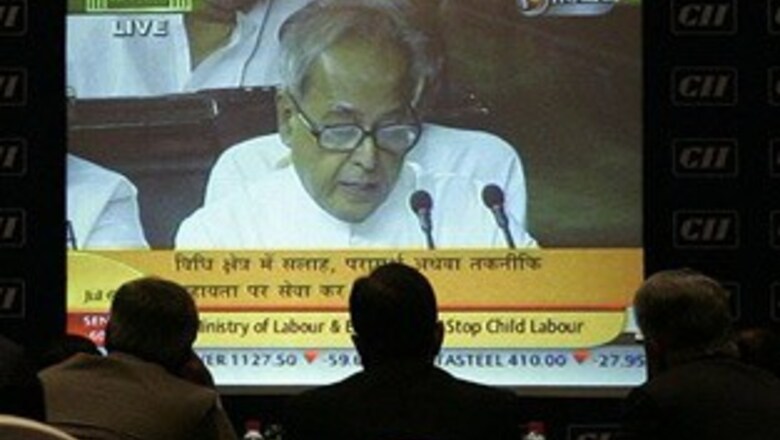
views
New Delhi: Finance Minister Pranab Mukherjee on Monday presented a revival-oriented Budget with more funds for welfare schemes and infrastructure, a promise to restore India's high economic growth and better delivery mechanisms to reach the fruits of development to the poorest.
Amid high hopes from industry and the average citizen alike, the Budget also promised new incentives to farmers, a big hike in funds for projects with emphasis on rural reconstruction and employment, more allocation for urban development and a fresh impetus to energy security.
During his 100-minute Budget speech in the Lok Sabha, Mukherjee promised a National Food Security Act soon to give 25 kg of rice or wheat per month to the poor at a subsidised price of Rs 3 per kg while promising a 40-percent hike in the health insurance scheme for people below the poverty line.
The 73-year-old politician, who had presented his last full Budget as Finance Minister in the Indira Gandhi government 25 years ago, said the new United Progressive Alliance (UPA) government would continue to push its agenda of ensuring "inclusive growth and equitable development" while also meeting the "rising expectations of a young India".
"The Government also recognises the challenges," Mukherjee said, referring to the task involved in countering the decline of India's high growth rate to 6.7 percent in the past year from over 9 percent in the preceding three.
"The first challenge is to bring back the GDP (gross domestic product) growth rate to over 9 percent per annum," he said, setting the tone of what is his fourth career budget watched by Prime Minister Manmohan Singh and UPA chairperson Sonia Gandhi.
He said the other challenges included better governance and ensuring that the fruits of development reached across regions to touch the lives of every citizen - the "aam admi" (the common man) as he called them.
"The finance minister has done an admirable job," the Prime Minister said, soon after the Budget was presented in the Lok Sabha. "The main aim of the budget is to minimise the impact of global recession," Manmohan Singh said.
PAGE_BREAK
"Overall, the strategy of the budget is to ensure that our economy recaptures the rhythm of the accelerated growth process. Simultaneously, it seeks to honour in large measure, the commitments we have made to our people."
The proposals, however, did not go down well with the stock markets, with the sensitive index (Sensex) of the Bombay Stock Exchange falling by over 900 points, or more than 6 percent.
However, India Inc, by and large, welcomed the proposals given the circumstances, but hoped for some more tax sops, while expecting a more definitive pronouncement in the area of selling government stake in state-run enterprises.
Mukherjee kept the corporate tax rate unchanged, even as the budget sought to reduce the burden on industry by abolishing commodities transaction tax and the fringe benefit tax but hiked the minimum alternate tax to 15 percent of book profits from 10 percent.
The Finance Minister also promised a pan-India goods and services tax from April next year and gave 100 percent tax deductions to political donations while assuring both short-term and medium-term steps to counter the negative fallout of the global slowdown.
In tax matters, the Budget sought to raise income tax exemption limits for senior citizens by Rs.15,000 and for women and other tax payers by Rs 10,000 each, while the 10 per cent surcharge on personal tax was scrapped altogether.
Mukherjee said infrastructure would also be a priority, especially in areas like roads, highways and energy. "I, on my part, will ensure that sufficient funds are made available to these sectors."
He also said the universal identity card plan would be operational in 12-18 months and the process would begin to hand over biometric smart cards to 1.17 billion Indian citizens.
He said the total central government expenditure for the current fiscal year had been stepped up to Rs.10,20,800 crore and compared it with Rs 193 crore that was projected in the country's first budget over six decades ago.
PAGE_BREAK
Mukherjee said with industry still under the grip of global recession, he was providing additional incentives in the form of both direct and indirect taxes.
He enhanced the customs duty on items like set-top boxes, LCD televisions and premium textile goods to encourage domestic production and value addition. He also reduced the excise duties on large vehicles and trucks.
The proposals on direct taxes, he said, would be revenue neutral, while indirect taxes would yield Rs.2,000 crore for the full fiscal.
Yet, Mukherjee hopes to step up the non-plan expenditure by 37 percent to Rs.6,95,689 crore (Rs.6,956 billion/$140 billion) over the 2008-09 and plan expenditure by 34 percent to Rs.3,25,149 crore (Rs.3,251.49 billion/$65 billion).
The total increase in expenditure, thus, is 36 percent, he said, as he kept the total borrowings at a high level, that will push up the country's fiscal deficit to 6.8 percent of GDP from 6 percent for 2008-09.
Mukherjee said the government will have to overcome all obstacles and create a brave new India. "As we begin this five-journey, the road ahead will not be easy. We will have to manage uncertainties and there will be as many problems as there would be solutions."




















Comments
0 comment